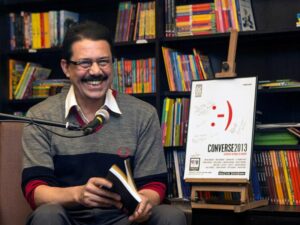Indira Goswami, affectionately known as Mamoni Raisom Goswami or Mamoni Baideo, stands as a towering figure in Indian literature. Her profound narratives, fearless social commentaries, and unwavering commitment to peace have left an indelible mark on Assamese and Indian literary landscapes.
Early Life and Education
Born on November 14, 1942, in Guwahati, Assam, Indira Goswami hailed from a Brahmin family that deeply valued education and culture. Her formative years were spent in Shillong and Guwahati, where she attended Pine Mount School and Tarini Charan Girls’ High School, respectively. Demonstrating an early aptitude for literature, she pursued Assamese literature at Cotton College and later obtained her postgraduate degree from Gauhati University .
Personal Struggles and Literary Genesis
Goswami’s life was punctuated by personal tragedies that profoundly influenced her writing. At the tender age of 13, she began penning short stories, encouraged by editor Kirti Nath Hazarika . However, her literary journey was deeply intertwined with personal loss. In 1966, she married Madhaven Raisom Iyengar, an engineer, but their union was tragically short-lived; he died in a car accident just 18 months later. This devastating event plunged her into a deep depression, leading her to seek solace in teaching at Goalpara Sainik School and later immersing herself in the spiritual environs of Vrindavan .
Literary Contributions and Themes
Goswami’s oeuvre is characterized by its unflinching exploration of societal taboos, marginalized voices, and the human psyche. Her narratives often delve into the lives of widows, laborers, and those ostracized by society.
- “The Moth Eaten Howdah of the Tusker” (Dontal Hatir Une Khowa Howdah): Set in mid-20th century Kamrup, this novel portrays the plight of Assamese Brahmin widows confined within the rigid structures of satras (Vaishnavite monasteries). Through the protagonist Giribala, Goswami critiques the oppressive customs that stifle women’s autonomy .
- “Pages Stained With Blood” (Tej Aru Dhulire Dhushorito Prishtha): Drawing from her firsthand experiences during the 1984 anti-Sikh riots in Delhi, this novel offers a harrowing account of communal violence. The narrative intertwines the personal and political, as the protagonist, a university teacher, navigates the chaos while forming a poignant bond with a Sikh rickshaw puller .
- “The Man from Chinnamasta” (Chinnamastar Manuhto): This controversial novel challenges the age-old practice of animal sacrifice at the Kamakhya Temple in Assam. By weaving in scriptural references, Goswami advocates for a more compassionate form of worship, emphasizing flowers over blood. The book sparked significant debate, with some factions even issuing threats against her .
Scholarly Pursuits and the Ramayana
Beyond fiction, Goswami was a distinguished scholar, particularly renowned for her studies on the Ramayana. Her comparative analysis of Tulsidas’s “Ramcharitmanas” and the Assamese version by Madhava Kandali culminated in the acclaimed work “Ramayana from Ganga to Brahmaputra.” This study not only highlighted the regional nuances of the epic but also underscored its universal themes .
Advocacy and Peace Initiatives
Goswami’s commitment to societal betterment extended beyond literature. She played a pivotal role in initiating peace talks between the Indian government and the United Liberation Front of Asom (ULFA). As a mediator, she facilitated dialogues that aimed to resolve long-standing conflicts in Assam, leading to the formation of the People’s Consultative Group (PCG) .
Recognition and Honors
Goswami’s literary brilliance and societal contributions garnered numerous accolades:
- Sahitya Akademi Award (1983): For her novel “Mamore Dhora Tarowal,” which delves into the lives of laborers constructing an aqueduct in Uttar Pradesh .
- Jnanpith Award (2000): India’s highest literary honor, recognizing her overall contribution to Assamese literature .
- Prince Claus Award (2008): Bestowed by the Netherlands for her impactful literary and social work .
- International Tulsi Award: From Florida International University, acknowledging her scholarly work on the Ramayana .
Legacy and Impact
Indira Goswami’s narratives transcended regional boundaries, resonating with readers across India and beyond. Her fearless exploration of taboo subjects, combined with her poetic prose, positioned her as a beacon of progressive thought in Indian literature. Through her writings, she gave voice to the voiceless, challenged societal norms, and championed the causes of the marginalized.
Her demise on November 29, 2011, marked the end of an era, but her legacy endures. Goswami’s works continue to inspire scholars, writers, and activists, reaffirming the power of literature as a catalyst for social change.






